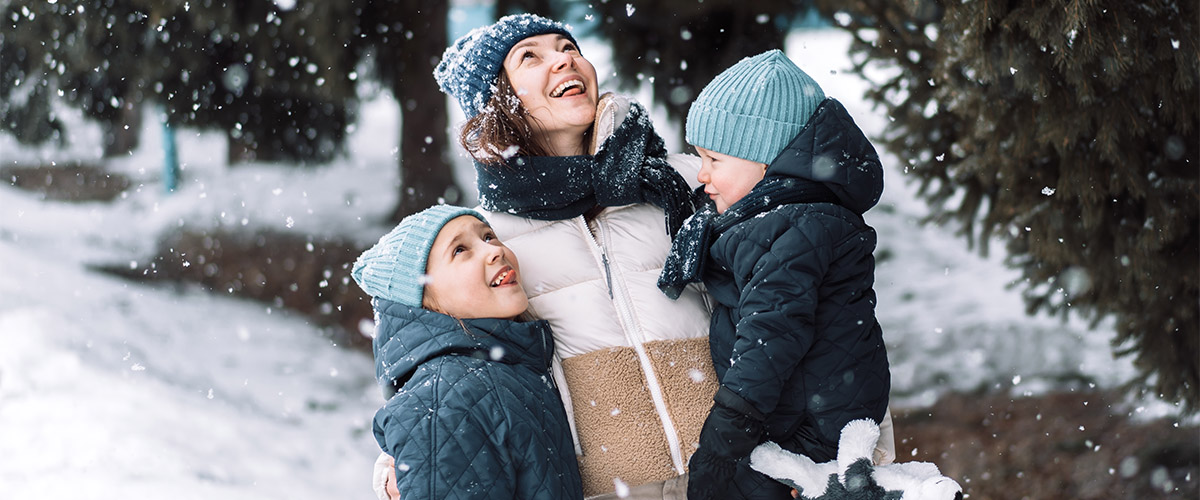Winter Health Awareness: Keep Yourself Safe This Season

November 10, 2025 | Tags:
Sled races, snowman building, snowball fights – winter weather can be a treat to go out and enjoy. However, it’s important to remember that winter carries unique weather conditions that can affect your health.
Cold weather can range from troubling to life-threatening
Walking and playing in a winter wonderland are fun, but it can be dangerous if you’re unprepared. Health conditions from prolonged exposure to the cold, like chilblains, hypothermia and frostbite, can cause mild to severe health injuries:
- Chilblains: Occurs when cold or damp – but not freezing – conditions cause patches of inflamed, swollen skin, mostly on hands and feet. Symptoms include blisters, burning or itching, skin color changes, pain or stinging. These can be irritating but don't usually cause permanent injury.
- Hypothermia: Occurs when your body’s temperature is abnormally low, below 95 degrees Fahrenheit (35 degrees Celsius). Symptoms can progress from mild to severe and include shivering, weak pulse, confusion or memory loss, slurred speech or mumbling, drowsiness or low energy.
- Frostbite: Occurs when your skin freezes from overexposure to freezing temperatures, most commonly on the nose, ears, fingers, toes, cheeks and chin. Depending on the stage, symptoms include numbness or tingling, redness or pain, white or grayish.
Hypothermia and frostbite can occur faster than you think. If you experience symptoms, seek medical attention immediately.
Dress appropriately when venturing outside to stay warm and dry, especially for long periods of time. Bundle up by layering to hold body heat and protect against wind, rain and snow. Change out of wet clothes as they can cause your body to continue to lose heat.
Protect your heart health from strenuous activity
Winter tasks like shoveling snow might seem like typical outdoor work. However, it can cause serious risks to your health, especially your heart. The combination of cold temperatures and exertion from muscle movement can put strain on the heart, triggering a heart attack. Shoveling snow can significantly impact people who have cardiovascular risks, like those with heart disease or high blood pressure. It can also exacerbate chronic conditions like arthritis and cause strain to your shoulders and back, adding stress to injuries. To make shoveling snow safe, practice proper shoveling techniques:
- Bend at the knees.
- Keep the shovel close to your body with one hand on the handle and the other placed down the shaft, closer to the blade.
- Push with your legs to reduce strain.
- Avoiding twisting or using your upper body or back.
- Push snow rather than lifting and throwing heavy shovelfuls.
Always listen to your body! Take frequent breaks and pay attention to whether you feel unwell or are showing signs of exhaustion. Take it slow and don't be afraid to ask someone for help. Know heart attack warning signs and call 911 immediately if you or someone you know experience symptoms. Also check out volunteer-based programs in your community that provide snow shoveling or plowing services to neighbors who need assistance, including seniors and those with disabilities.
Caution: Icy conditions lead to falls
Snow and ice aren’t the only things that fall during winter – people do, too! Snow, ice and freezing temperatures attribute to slippery conditions and an increased risk of outside falls, which can be dangerous, especially for older adults. Injuries can include:
- Fractures to the wrists, arms, hips and ankles.
- Sprains and dislocations to joint areas, like the shoulder or knee.
- Strains to muscles in the neck or back.
- Head injuries, like a concussion.
Injuries from these accidents can impact and even diminish a person’s quality of life, like taking a long time to heal or causing loss of function. Falls can also strand people outside in harsh conditions, leading to complications like hypothermia or frostbite. To minimize your risk of falling, consider the following:
- Wear proper footwear with good support.
- Don’t rush; take your time and walk slowly.
- Take small steps from side to side, like a penguin waddle.
- Stay indoors when weather conditions are poor.
Be prepared ahead of bad weather with salt and other deicers, which can be effective at causing ice to melt to prevent falls. Solutions with and without chloride work by lowering the freezing point of water. Check which options you’ll need as some work in different temperatures while others are more environmentally and pet friendly. Always tell someone when you’re going out alone. If you do fall, try landing on a cushioned area of your body, like your thigh or buttock. Wait for someone to help you in case you’re injured and to prevent any further falls.
Check in with your provider
Enjoy a healthy and happy winter season! Talk with your primary care provider (PCP) if you experience any injuries or illnesses from being outdoors. If you don’t have a PCP, Medical Mutual can help. Use our Find a Provider tool on My Health Plan to find one in your plan’s network or call the Customer Care number listed on your member ID card.


